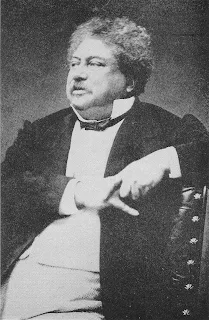When the 1848 Revolution came, Dumas published an appeal to the workers of Paris in which he presented himself to them as one of their own. In twenty years, he had made 400 novels and 35 plays: he had been the source of the daily bread of 8,160 people. [My translation]

I thought that was a fascinating fact, and looked up the proclamation, which is reprinted, in part, in the Nouvelle Revue, vol. 8. Here is a bit of it:
I am putting myself forward as a candidate to the legislature, and I am asking for your voices. Here are my titles to your trust:And so on. [My translation]
“Without counting six years of education, four years under a notary and seven years in an office, I have worked twenty years, ten hours a day, which is 73,000 hours. During these twenty years I composed 400 volumes and 35 dramas. The first print runs of the 400 volumes were at 4,000 and sold at 5 francs, producing 11,853,000 francs. Here’s a list:
To the editors… 264,000
To the printers… 528,000
To the paper merchants…. 633,000
To the advertising brochure designers…120,000
To the bookstores… 2,400,000
To the brokers…1,600,000
To the salesmen…1, 600,000
To the deliverers… 100,000
To the bookstores…4,580,000
To the illustrators…28,000
Total: 11,853,000 In putting the daily wage at 3 francs, and assuming 300 work days, my books have, over 20 years, employed 692 people.”
Thus, 140 years before Romer's Increasing Returns and Long Run Growth inaugurated the growth school, taking up, finally, the issue of increasing returns on investment, Dumas had already been there.
Mainstream economics has, of course, congealed around the image of decreasing return on investment. The volume of the Three Musukateers you purchase at the store has already gone through a certain amount of deterioration by the time it is lodged on the shelf of the book store. The very act of shelving it may have bent the cover a bit. The chemicals that make up the page – even if, as the small print tells you, the pages are acid free, which became standard in paperbacks in the nineteen nineties – are of course subject to the stains and stresses of use, especially if you mix eating and reading. The glue that binds the pages – especially in a 720 page paperback, which is the number of pages in the Penguin translation of The Three Muskateers – dries and loses its hold.
Thus, as a physical product, the book you purchased rapidly loses value. Take it to a used book store and you may get ten percent for what you paid for it. Of course, the very signs of deterioration can become beloved – an old hardback “in good condition” can become a collectors item. But, in general, that particular book deteriorates in value.
But does The Three Muskateers deteriorate in value? Posing the question points to the oddity of The Three Muskateers – what is it? It is like the Kingdom of Heaven – you can’t say that it is over here, or over there. The Three Muskateers is within ye - or rather, in what Lotman calls the noosphere. It doesn’t have a unique physical embodiment. It is, to use an ugly word, information. Has that information deteriorated? This can of course happen. When I open a notebook of mine at random, I often find hastily jotted down phone numbers and names. They have no meaning to me now, no use value. They have, in fact, deteriorated in value.
The Three Muskateers, on the contrary, has only gained in value. It has been translated and re-translated into all major languages. From a hasty look at IMBD, it seems that nineteen movies have been made with that title, including one starring Mickey Mouse and Goofy. If Dumas were to write his accounts now, he would no doubt find that, over the century and a half, The Three Muskateers have generated more than a billion dollars in value.
If we compare, say, the value generated by Ulysses, from the sale of the book itself to the tourist industry that has absorbed Bloomsday, etc., to two inventions of the 20s – the lead additive for gasoline, and the CFCs that were the basis of air conditioning, both the brainchildren of Thomas Midgely – we would find an interesting info track, in which all increased in value up until a certain point. Lead based additives for gasoline, it was discovered in the late sixties, translated into lead based additives in the human body. Not a good scenario. Then, in the 1980s, CFCs, which basically made the sunbelt in the United States, were found to have made a vast and growing hole in the ozone. And so both of Midgely’s products have had a shorter shelf life than Ulysses.
The simple lesson from this is that the university that lavishes attention and money on building that bio-engineering laboratory, and stingily withholds money from the English department building that was erected in 1910, is actually making an irrational decision even under its own capitalistic premises. The nano-tech device that comes out of the bio-engineering building may well never surpass, in cash value, the novel that comes out of the creative writing department. As is well known, since the late nineties, big Pharma, for instance, has spent literally tens of billions of dollars trying to develop the next generation of blockbuster drugs and has failed. The pipeline has long been clogged by mere tweaks, which exist for the sole purpose of extending patents – thus bringing together rent seeking behavior and engineering in a sort of male pattern baldness/penile lengthener festuche. But the humanities departments seemingly don’t know how to fight for themselves on this terrain. They should, of course, turn to Alexander Dumas for help. Also, they may want to try his recipe for Anchoïade Monte Cristo


No comments:
Post a Comment